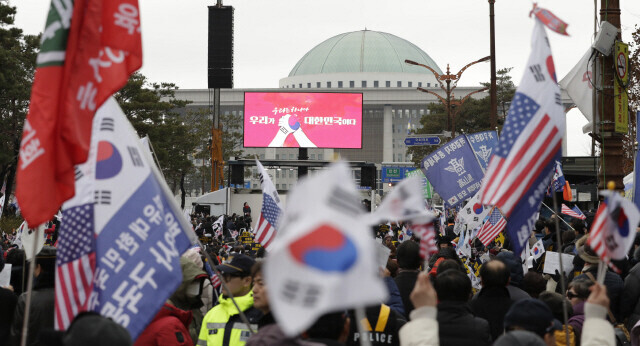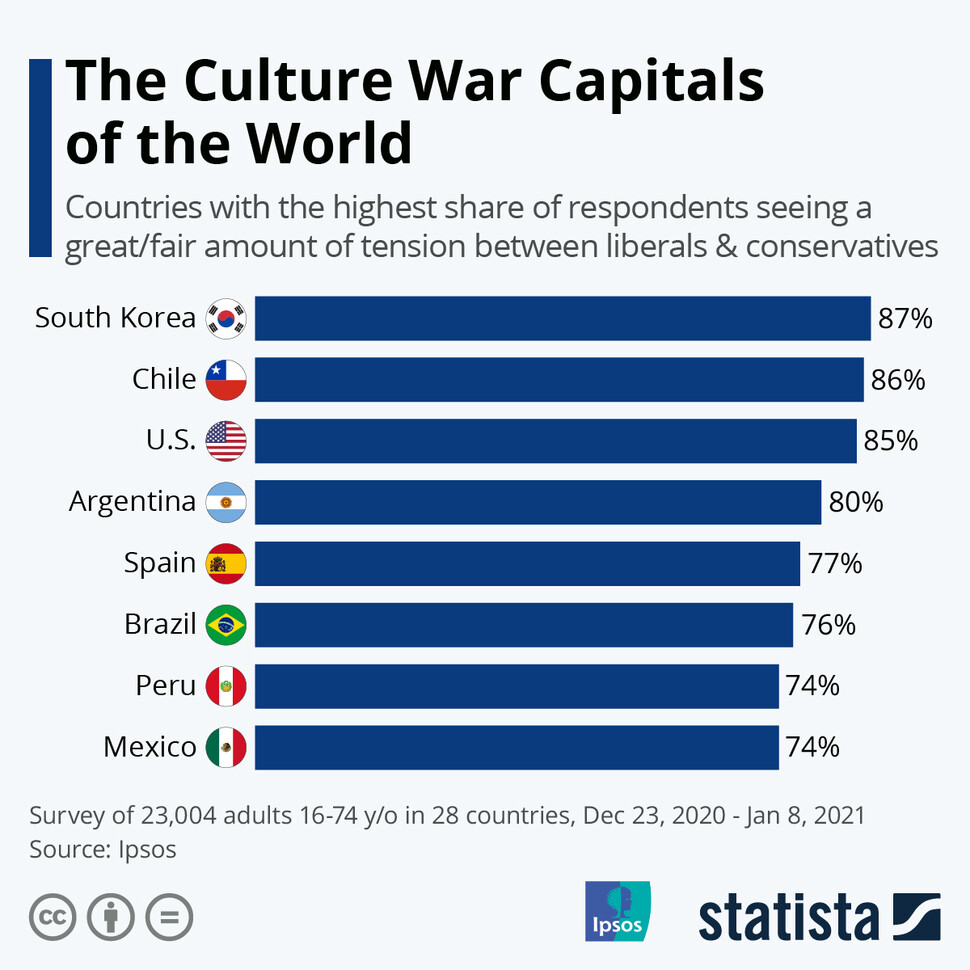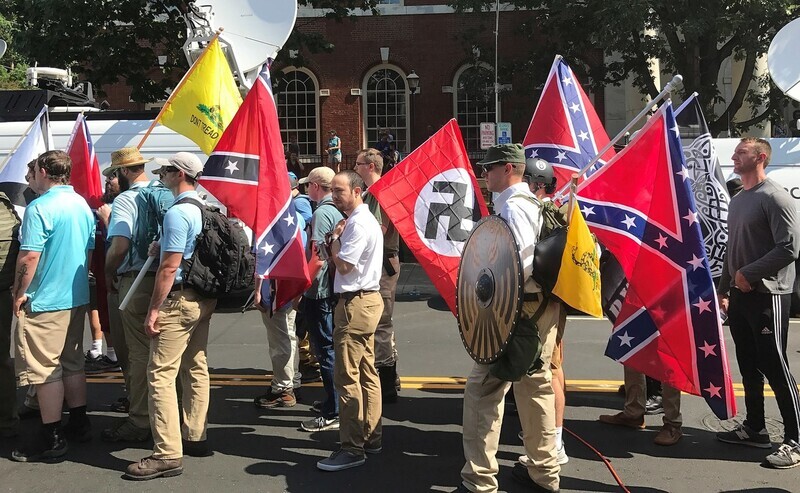hankyoreh
Links to other country sites 다른 나라 사이트 링크
S. Korea is culture war capital of world, survey reveals

South Korea is suffering through some of the worst “culture wars” anywhere in the world, survey results suggest.
The term “culture war” refers to a clash within countries among groups defined by different political perspectives, social class, income and assets, ages, genders, religions, ethnicities, and regions.
The multinational research firm Ipsos and the Policy Institute at King’s College London recently shared findings from surveys of around 23,000 adults in 28 different countries.
The results showed South Korea ranking at the top globally for the severity of “culture wars” as perceived by residents in seven out of 12 conflict categories, including conflicts between progressives and conservatives.
Progressive/conservative conflicts are seen as one of the most important culture war categories. Eighty-seven percent of respondents, or nearly nine out of every 10, agreed that such conflicts exist in South Korea — the highest rate for any of the countries examined.

The rate was even higher than the 85% recorded for the US, which experienced intense political frictions during last year’s presidential election. The rate for Chile was 86%, putting it narrowly in second place behind South Korea.
The same philosophical conflicts among South Koreans were also evident in the 91% of respondents who agreed that conflicts exist among supporters of different political parties.
The lowest rates of respondents reporting conflict between progressives and conservatives were found in Japan and China, where 39% and 37% said such conflicts exist, respectively.
”Immigration” and “ethnicity” culture wars only ones not perceived as severeSouth Korea also posted the highest rates in categories of conflict between the rich and poor (91%), men and women (80%), old and young (80%), those with and without a university education (70%), and different religions (78%).
Out of the five categories where it did not rank first, South Korea placed second or third in three others: conflict between different social classes (87%, 2nd), those in and outside of cities (58%, 3rd), and the metropolitan elite and ordinary working people (78%, 3rd).
In only two categories did South Koreans not perceive conflicts to be severe: those involving immigrants and natives (66%, 15th) and those involving different ethnicities (67%, 11th).
The US ranked first with 83% in terms of tensions among different ethnicities, while South Africa ranked first with 89% in terms of conflicts involving immigrants and natives. Chile ranked first in the categories of conflicts between the metropolitan elite and ordinary working people (84%), between different social classes (88%), and between rich and poor (91%, tied with South Korea).
In terms of conflict between those in and outside of cities, Peru ranked first with 66%.

South Koreans ranked only eighth for positive responses when asked, “From what you see on TV, in the news media and online, and in your conversations with others, to what extent do you agree or disagree that [South Korea] is divided by ‘culture wars’?”
Only 44% of South Korean respondents — fewer than half — answered in the affirmative. In contrast, three countries had rates of positive responses at least 10 percentage points higher than all the rest: South Africa (58%), India (57%), and the US (57%).
For all countries examined, conflicts between rich and poor were rated as the most severe among the 12 categories. Seventy-four percent of all respondents reported a “fair amount” of tensions between the rich and poor.
The next highest-rated categories were conflicts between people who support different political parties (69%), between different social classes (67%), and between immigrants and natives (66%).
King’s College London Policy Institute Director Bobby Duffy, who co-directed the study, explained, “International comparisons put your own country’s problems into perspective.”
“By taking a global perspective, we can put some context around the state of so-called culture wars in the UK,” he added.
The survey was administered through Ipsos’ online platform between Dec. 23, 2020, and Jan. 8, 2021. Ipsos explained that the survey data was weighted to reflect the demographic profile of the respective country’s adult population.
By Kwak No-pil, senior staff writer
Please direct comments or questions to [english@hani.co.kr]

Editorial・opinion
![[Editorial] Does Yoon think the Korean public is wrong? [Editorial] Does Yoon think the Korean public is wrong?](https://flexible.img.hani.co.kr/flexible/normal/500/300/imgdb/original/2024/0417/8517133419684774.jpg) [Editorial] Does Yoon think the Korean public is wrong?
[Editorial] Does Yoon think the Korean public is wrong?![[Editorial] As it bolsters its alliance with US, Japan must be accountable for past [Editorial] As it bolsters its alliance with US, Japan must be accountable for past](https://flexible.img.hani.co.kr/flexible/normal/500/300/imgdb/original/2024/0417/6817133413968321.jpg) [Editorial] As it bolsters its alliance with US, Japan must be accountable for past
[Editorial] As it bolsters its alliance with US, Japan must be accountable for past- [Guest essay] Amending the Constitution is Yoon’s key to leaving office in public’s good graces
- [Editorial] 10 years on, lessons of Sewol tragedy must never be forgotten
- [Column] A death blow to Korea’s prosecutor politics
- [Correspondent’s column] The US and the end of Japanese pacifism
- [Guest essay] How Korea turned its trainee doctors into monsters
- [Guest essay] As someone who helped forge Seoul-Moscow ties, their status today troubles me
- [Editorial] Koreans sent a loud and clear message to Yoon
- [Column] In Korea’s midterm elections, it’s time for accountability
Most viewed articles
- 1‘Right direction’: After judgment day from voters, Yoon shrugs off calls for change
- 2[Editorial] Does Yoon think the Korean public is wrong?
- 3[Editorial] As it bolsters its alliance with US, Japan must be accountable for past
- 4Where Sewol sank 10 years ago, a sea of tears as parents mourn lost children
- 5Strong dollar isn’t all that’s pushing won exchange rate into to 1,400 range
- 6[Guest essay] Amending the Constitution is Yoon’s key to leaving office in public’s good graces
- 7Japan officially says compensation of Korean forced laborers isn’t its responsibility
- 8[News analysis] Watershed augmentation of US-Japan alliance to put Korea’s diplomacy to the test
- 9Korea ranks among 10 countries going backward on coal power, report shows
- 10US, Japan and China move to become self-sufficient in semiconductors